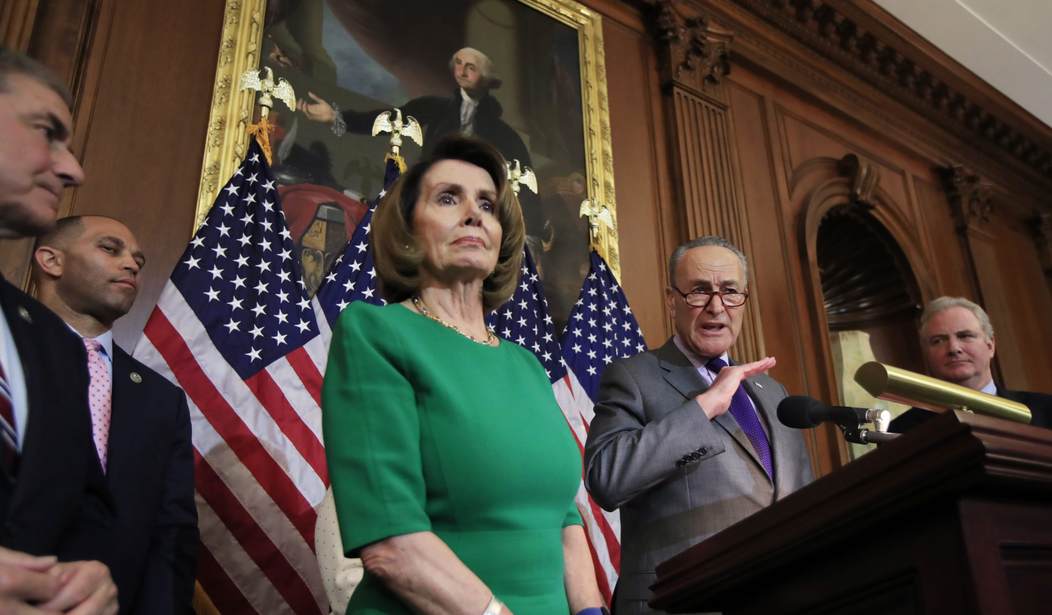When Republicans in the U.S. House and Senate passed historic tax reform that will decrease taxes for more than 80 percent of Americans, Democrats branded the tax cut a “heist.” Terms such as “looting,” “theft,” and “heist” suggested that Republicans weren’t giving Americans back more of their hard-earned money, but rather stealing from the poor to give to the rich. This rhetoric is revealing — it shows that Democrats no longer believe in private property, a cornerstone of American values and the basis on which President Abraham Lincoln argued against slavery.
“Shamefully, Republicans were cheering against the children as they rob from their future and ransack the middle class to reward the rich,” House Minority Leader Nancy Pelosi (D-Calif.) tweeted, adding the hashtag #GOPTaxScam. She was far from alone in adopting such rhetoric.
Shamefully, Republicans were cheering against the children as they rob from their future and ransack the middle class to reward the rich #GOPTaxScam
— Nancy Pelosi (@SpeakerPelosi) December 19, 2017
“Yet again, Republicans showed their only priority is to give the richest few a bigger piece of the pie,” Senate Minority Leader Chuck Schumer (D-N.Y.) tweeted.
Yet again, Republicans showed their only priority is to give the richest few a bigger piece of the pie.
— Chuck Schumer (@SenSchumer) December 20, 2017
Sen. Elizabeth Warren (D-Mass.) echoed her fellow Democrats. “The bill that the Republicans jammed through the senate tonight isn’t tax reform. It’s a heist. Let’s call this out for what it is: Government for sale.”
The bill that the Republicans jammed through the Senate tonight isn’t tax reform. It’s a heist. Let's call this out for what it is: Government for sale. #GOPTaxScam
— Elizabeth Warren (@SenWarren) December 20, 2017
Sen. Bernie Sanders (I-Vt.), who nearly won the Democratic presidential nomination last year, described the tax bill this way: “What we are seeing today, in an unprecedented way, is the looting of the federal Treasury.”
What we are seeing today, in an unprecedented way, is the looting of the federal Treasury. https://t.co/G0XjvfNwC9 pic.twitter.com/LGvf1VhH0s
— Bernie Sanders (@SenSanders) December 19, 2017
Few Democrats echoed the talking point quite as succinctly as Rep. David Cicilline (D-R.I.). “The #GOPTaxScam represents the wholesale looting of America by the wealthy at the expense of middle class families,” Cicilline tweeted.
The #GOPTaxScam represents the wholesale looting of America by the wealthy at the expense of middle class families. https://t.co/W24zmdpCn5
— Cicilline Press Office (@RepCicilline) December 20, 2017
Each of these attacks followed a common thread, an argument that by cutting taxes, Republicans were not just increasing the federal debt — a legitimate concern about the tax bill — but actively stealing from the government, and therefore stealing from the American people.
In a moment of absurdity, Pelosi even tweeted that the tax bill would “raise taxes on 86 million middle class families.”
There are few things more disturbing than hearing the swell of cheers from the @HouseGOP as they raise taxes on 86 million middle class families. #GOPTaxScam
— Nancy Pelosi (@SpeakerPelosi) December 19, 2017
Even the Left-leaning Tax Policy Center admitted that a full 80 percent of Americans would receive a tax cut from the reform. Even so, most Americans earning less than $50,000 per year think their taxes will go up as a result of the bill. Why?
Democrats have emphasized the fact that the tax cuts for individuals will expire in 2027. Even if these cuts are not extended (as the Bush tax cuts were), tax rates will merely go back to the pre-2017 status quo. Make no mistake: this tax cut bill will not increase taxes on the middle class.
The Democrats’ central concern isn’t that taxes will be raised on the middle class, but that Republicans are taking away money that Democrats believe belongs to the federal government. This is the root of all the “heist” rhetoric — Democrats no longer believe in the basic principle of private property.
America was founded on the idea that government exists to protect certain rights, and one of the most important rights is property. The American Revolution was premised on the idea that Parliament had denied Americans their rights as Englishmen by taxing them without their consent. John Locke, a central influence on the Founders, rooted government in the defense of “life, liberty, and property,” a position echoed in the Declaration of Independence: “We hold these truths to be self-evident, that all men are created equal, that they are endowed by their Creator with certain unalienable Rights, that among these are Life, Liberty and the pursuit of Happiness.”
Perhaps the most powerful defense of private property came from President Abraham Lincoln in his arguments against slavery as a moral evil. In his seventh debate with Stephen Douglas in Alton, Ill., Lincoln presented the clear issue at hand.
“That is the issue that will continue in this country when these poor tongues of Judge Douglas and myself shall be silent, It is the eternal struggle between these two principles — right and wrong — throughout the world,” Lincoln declared. “They are the two principles that have stood face to face from the beginning of time; and will ever continue to struggle. The one is the common right of humanity and the other the divine right of kings.”
“It is the same spirit that says, ‘You work and toil and earn bread, and I’ll eat it,'” Lincoln said. “No matter in what shape it comes, whether from the mouth of a king who seeks to bestride the people of his own nation and live by the fruit of their labor, or from one race of men as an apology [a justification] for enslaving another race, it is the same tyrannical principle.”
In his Second Inaugural Address, Lincoln again emphasized this principle. “It may seem strange that any men should dare to ask a just God’s assistance in wringing their bread from the sweat of other men’s faces, but let us judge not, that we be not judged,” the president said, articulating the very basis of why slavery is a fundamental moral evil.
According to Lincoln, slavery undercut the words of God. He referenced Genesis 3:19, “In the sweat of thy face shalt thou eat bread, till thou return unto the ground.” Slavery was wrong because it treated the root of private property — a human being’s free labor — as a given, something belonging not to the person who worked but to someone who did not.
The principle of slavery — you earn bread and I’ll eat it — is the same principle against which the patriots fought in the American Revolution, according to Lincoln. He would say it is the same principle behind socialism — the idea that property earned through toil does not belong to the worker but to the government.
Democrats could argue against the tax bill in a number of ways. The bill effectively repealed a key provision of Obamacare — the individual mandate. The bill may well increase the federal deficit. The bill did not nearly do enough to simplify the tax code.
Instead of engaging in these more difficult arguments, Democrats adopted the talking point that the tax cuts are stealing from the federal government. They argued that Americans do not have a right to the fruits of their labor, but that all property essentially belongs to the government.
In other words, the Left has adopted wholesale what Abraham Lincoln called the “same tyrannical principle” behind slavery and the “divine right of kings.” Democrats have rejected private property, and in so doing they rejected a core principle at the heart of America.
The Democrats’ false rhetoric about the Republican tax cuts may be their own political undoing, as Americans begin to tease out exactly why liberals fought against the idea that citizens should hold on to more of their hard-earned cash. If independents ask Democrats why they fought against the tax cut, they may not like the honest answer.









Join the conversation as a VIP Member